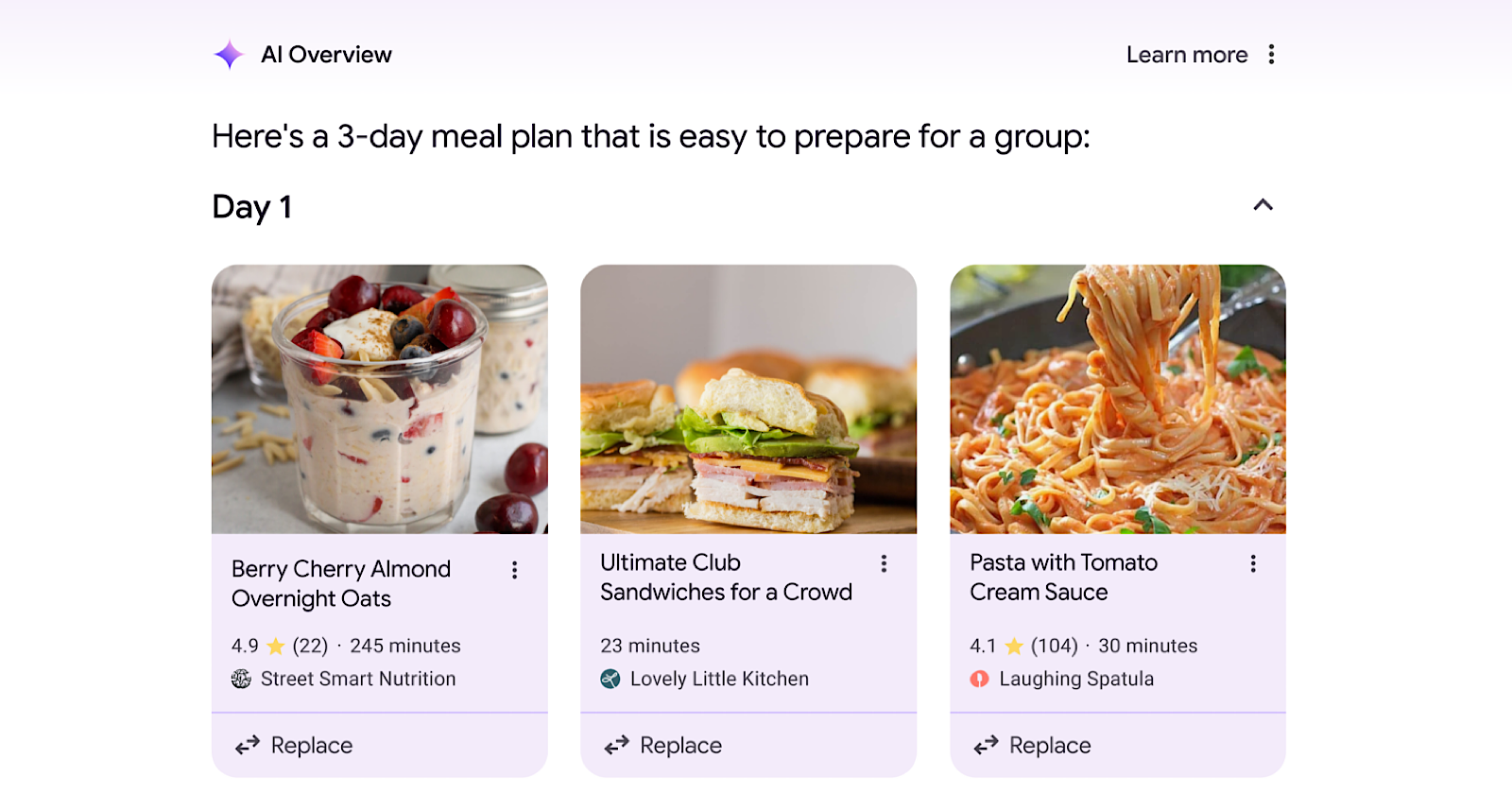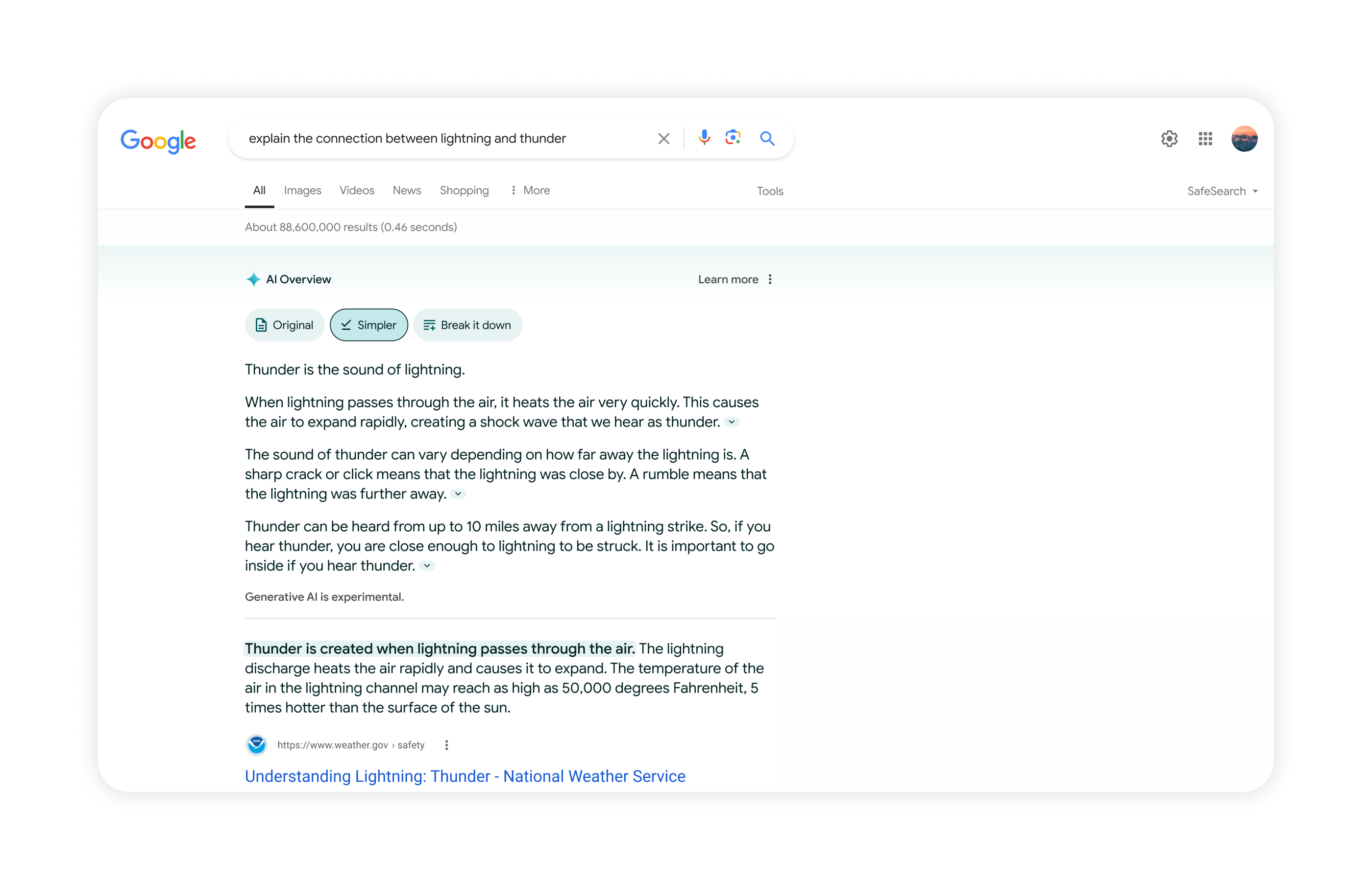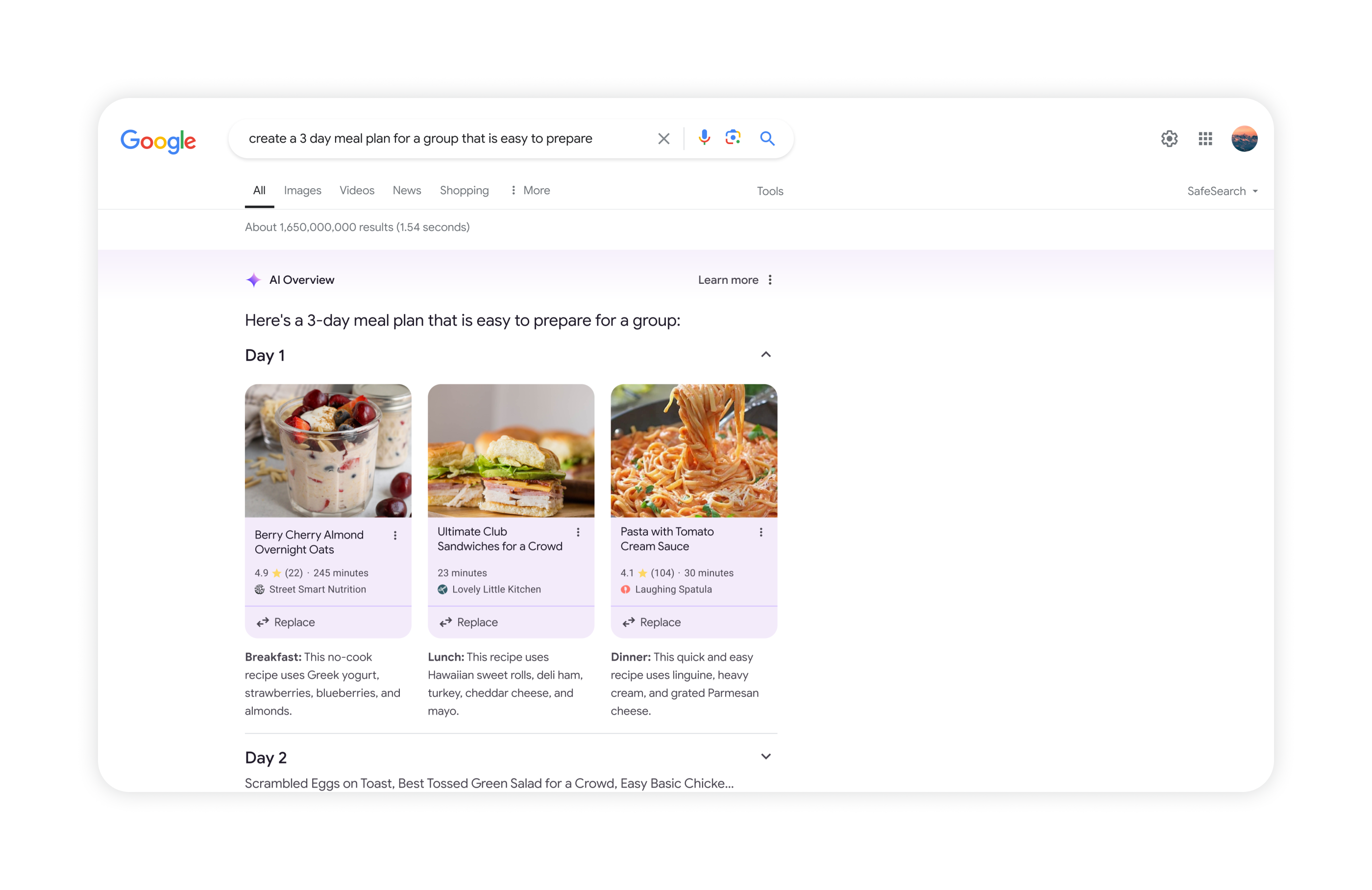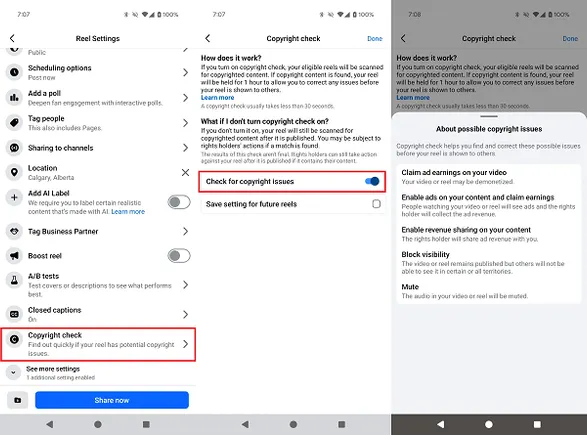Google Rolls Out AI-Powered Overviews To US Search Results via @sejournal, @MattGSouthern
Google rolls out AI-generated overviews (formerly SGE) to US search results, powered by a new Gemini model customized for search. The post Google Rolls Out AI-Powered Overviews To US Search Results appeared first on Search Engine Journal.

At its annual I/O developer conference, Google unveiled plans to incorporate generative AI directly into Google Search.
Additionally, Google announced an expansion to its AI-powered search experience, designed to reinvent how people discover and consume information.
Upcoming upgrades include:
Adjustable overviews to simplify language or provide more detail Multi-step reasoning to handle complex queries with nuances Built-in planning capabilities for tasks like meal prep and vacations AI-organized search result pages to explore ideas and inspiration Visual search querying through uploaded videos and imagesLiz Reid, Head of Google Search, states in an announcement:
“Now, with generative AI, Search can do more than you ever imagined. So you can ask whatever’s on your mind or whatever you need to get done — from researching to planning to brainstorming — and Google will take care of the legwork.”
What’s New In Google Search
New Gemini Model
A customized Gemini language model is central to Google’s AI-powered Search revamp.
Google’s announcement states:
“This is all made possible by a new Gemini model customized for Google Search. It brings together Gemini’s advanced capabilities — including multi-step reasoning, planning and multimodality — with our best-in-class Search systems.”
AI overviews generate quick answers to their queries, piecing together information from multiple sources.
Google reports that people have already used AI Overviews billions of times through Search Labs.
AI Overviews In US Search Results
Google is bringing AI overviews from Search Labs into its general search results pages.
That means hundreds of millions of US searchers will gain access to AI overviews this week and over 1 billion by year’s end.
 Image Credit: blog.google/products/search/generative-ai-google-search-may-2024/, May 2024.
Image Credit: blog.google/products/search/generative-ai-google-search-may-2024/, May 2024.
Searchers will soon be able to adjust the language and level of detail in AI overviews to suit their needs and understanding of the topic.
 Image Credit: blog.google/products/search/generative-ai-google-search-may-2024/, May 2024.
Image Credit: blog.google/products/search/generative-ai-google-search-may-2024/, May 2024.
Complex Questions & Planning Capabilities
Gemini’s multi-step reasoning capabilities will allow you to ask complex questions and receive detailed answers.
For example, you could ask, “Find the best yoga or pilates studios in Boston and show details on their intro offers and walking time from Beacon Hill,” and receive a comprehensive response.
 Image Credit: blog.google/products/search/generative-ai-google-search-may-2024/, May 2024.
Image Credit: blog.google/products/search/generative-ai-google-search-may-2024/, May 2024.
In addition to answering complex queries, Google will offer planning assistance for various aspects of life, such as meal planning and vacations.
You can request a customized meal plan by searching for something like “create a 3-day meal plan for a group that’s easy to prepare.” You will receive a tailored plan with recipes from across the web.
AI-Organized Results & Visual Search
Google is introducing AI-organized results pages that categorize helpful results under unique, AI-generated headlines, presenting diverse perspectives and content types.
This feature will initially be available for dining and recipes, with plans to expand to movies, music, books, hotels, shopping, and more.
Google will also enable users to ask questions using video content. This visual search capability can save you time describing issues or typing queries, as you can record a video instead.
 Image Credit: blog.google/products/search/generative-ai-google-search-may-2024/, May 2024.
Image Credit: blog.google/products/search/generative-ai-google-search-may-2024/, May 2024.
What Does This Mean For Businesses?
While Google touts this update as a way to enhance search quality, the prominence of AI-generated content could impact businesses and publishers who rely on Google Search traffic.
AI overviews occupy extensive screen real estate and could bury traditional “blue link” web results, significantly limiting clickthrough rates.
Data from ZipTie and Search Engine Journal contributor Bart Goralewicz indicate that AI overviews cover over 80% of search queries across most verticals.
Additionally, under the unique ranking system for AI overviews, only 47% of the top 10 traditional web results appear as sources powering the overview generation.
Bart Goralewicz, Founder of Onely, discovered this about AI overviews (formerly known as SGE):
“SGE operates on a completely different level compared to traditional search. If you aim to be featured in Google SGE, you’ll need to develop a distinct strategy tailored to this new environment. It’s a whole new game.”
Tomasz Rudzki of ZipTie cautions:
“Google SGE is the most controversial and anxiety-provoking change in search,” commented. With so much changing week by week, businesses relying on organic search must carefully monitor SGE’s evolution.”
How To Optimize Your Site For AI Overviews
As AI search accelerates, SEO professionals and content creators face new challenges in optimizing for discoverability.
Consider implementing these tactics for a potential increase in visibility in search results.
Structure content explicitly as questions and direct answers.
With AI overviews answering queries directly, optimizing content in a question-and-answer format may increase the likelihood of having it surfaced by Google’s AI models.
Create topic overview pages spanning initial research to final decisions.
Google’s AI search can handle complex, multi-step queries. Creating comprehensive overview content that covers the entire journey—from initial research to final purchasing decisions—could position those pages as prime sources for Google’s AI.
Pursue featured status on high-authority Q&A and information sites.
Studies found sites like Quora and Reddit are frequently cited in Google’s AI overviews. Having authoritative, industry-expert-level content featured prominently on these high-profile Q&A platforms could increase visibility within AI search results.
Maximize technical SEO for improved crawling of on-page content.
Like traditional search-leveraged web crawlers, Google’s AI models still rely on crawling a site’s content. Ensuring optimal technical SEO for crawlers to access and adequately render all on-page content is crucial for it to surface in AI overviews.
Tracking search volume for queries exhibiting AI overviews.
Identifying queries that currently trigger AI overviews can reveal content gaps and optimization opportunities. Tracking search volume for these queries enables prioritizing efforts around high-value terms and topics Google already enhances with AI results.
Looking Ahead
As Google moves forward with its AI-centric search vision, disruptions could reshape digital economies and information ecosystems.
Companies must acclimate their strategies for an AI-powered search landscape.
We will be following these developments closely at Search Engine Journal with an aim to provide strategies to help make your content discoverable in AI overviews.

 FrankLin
FrankLin 
































